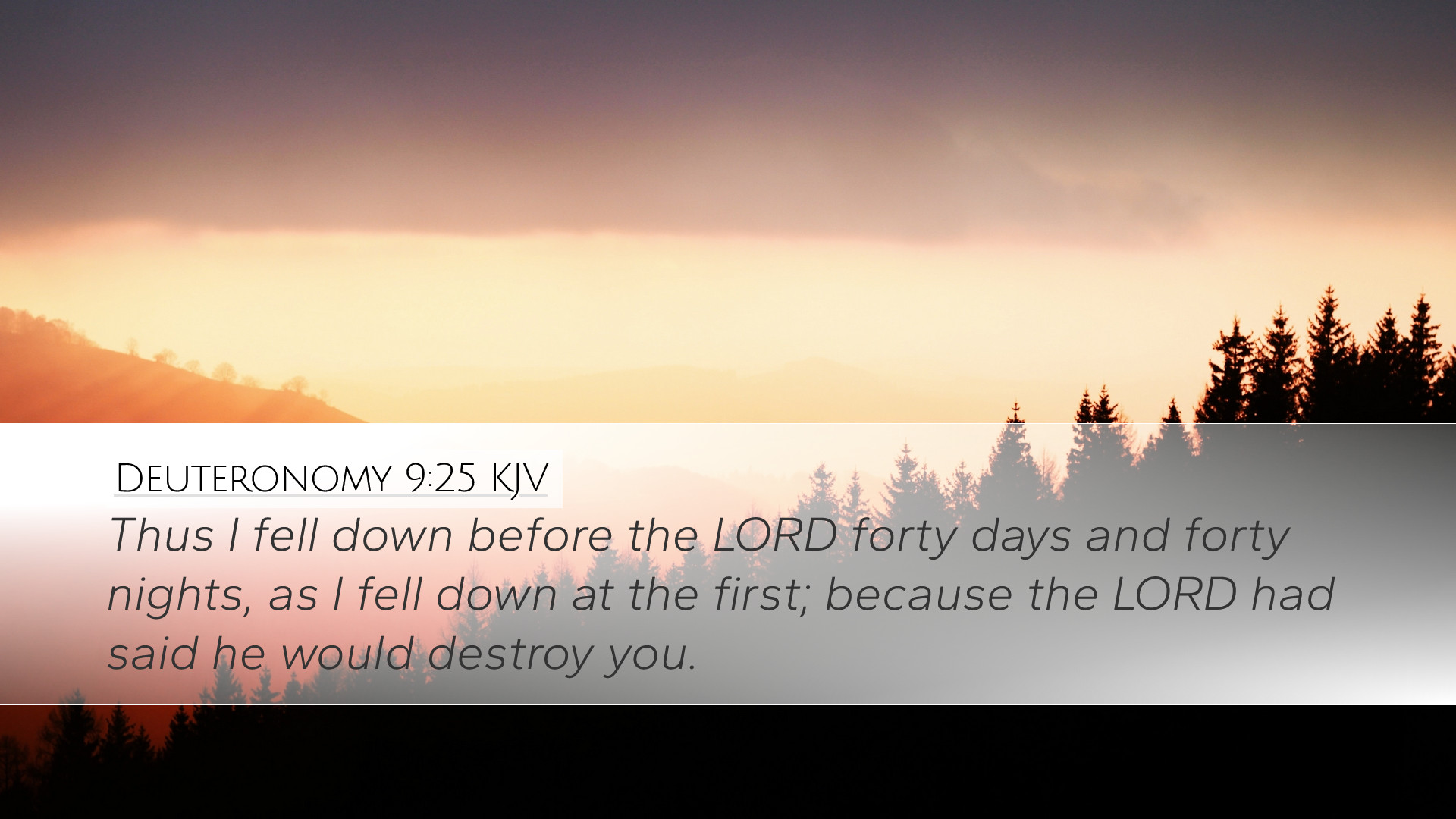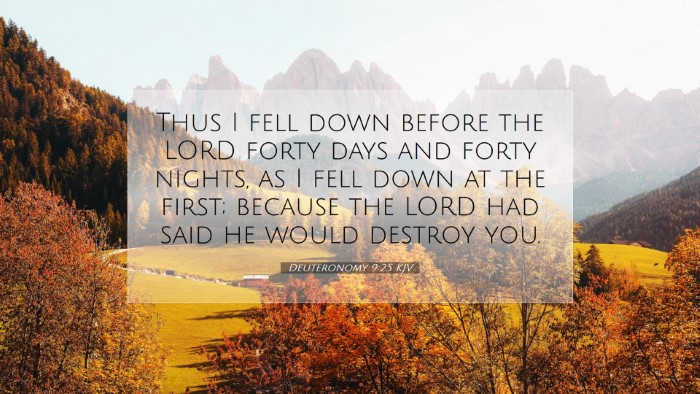Commentary on Deuteronomy 9:25
Verse Text: "Thus I fell down before the LORD forty days and forty nights, as I did at the first; because the LORD had said he would destroy you." (Deuteronomy 9:25)
Introduction
Deuteronomy 9:25 references a significant moment in the history of Israel, when Moses interceded for the people of Israel after their rebellion with the golden calf. This verse is a remarkable display of Moses’ leadership, his deep relationship with God, and the weight of intercession for a stubborn and wayward people. This commentary will explore the implications of this verse, drawing insights from classic public domain commentaries.
Moses' Intercession
Moses acts as a mediator between God and the people, illustrating the concept of intercession:
- Matthew Henry: Henry highlights Moses' role as a type of Christ, interceding despite the people’s unfaithfulness. His act of falling down before the Lord indicates deep humility and desperation.
- Albert Barnes: Barnes notes the emotional weight behind Moses' intercession; he felt the burden of their sin and the potential loss of God’s favor. His forty-day fast reflects both his grief and commitment to plead on their behalf.
- Adam Clarke: Clarke emphasizes that Moses' actions demonstrate extraordinary devotion. The repetition of the forty days signifies not only the seriousness of the situation but also Moses' unwavering dedication to seek mercy for the people.
The Significance of Forty Days
The mention of "forty days" carries thematic weight throughout Scripture:
- Moses’ Pattern: This was not the first time Moses spent forty days in the presence of the Lord, as seen earlier in Exodus 34. Each instance shows a transformative period of divine encounter, crucial decisions, and leadership.
- Divine Favor and Judgment: The number forty is often associated with trial and testing in the Bible. This mirrors the experience of the Israelites in the wilderness and foreshadows the challenges they would subsequently face.
- Preparation for Revelation: As Barnes suggests, the forty days served not just as a plea but also prepared Moses to receive further commandments and understanding of God’s covenant.
The Context of Rebellion
This verse arises in a context of grave rebellion against God:
- Israel’s Sin: The previous chapters of Deuteronomy recount the grievous sin of idol worship—making a golden calf while Moses was with God. This act represented a blatant rejection of God, demanding Moses’ immediate attention.
- The Weight of Leadership: As Henry articulates, Moses’ burden was twofold: the personal responsibility of leading a disobedient people and the fear of God’s wrath leading to their destruction. His intercession was a desperate appeal for mercy.
Theological Implications
This verse raises important theological considerations:
- God’s Justice and Mercy: God’s intention to destroy the people represents divine justice. However, through Moses' intercession, we see a profound example of mercy. Clarke notes that God relented, honoring Moses’ appeal, showcasing the balance of judgment and grace.
- Christ as Intercessor: The enduring theme of Moses as an intercessor foreshadows the ultimate intercession of Jesus Christ, the “great high priest” who intercedes for humanity. This linkage adds richness to understanding Moses’ role and signals to believers the nature of Christ’s work.
Application for Today
This verse has several applications for pastors, students, theologians, and Bible scholars:
- Intercessory Prayer: The practice of intercessory prayer is modeled by Moses. Believers are encouraged to take on this responsibility, recognizing the power of prayer to effect change and seek God’s favor for others.
- Leadership Accountability: Moses exemplifies the weight of leadership that often entails bearing the sins of those one leads. This calls modern leaders to be diligent in their spiritual walks, holding themselves accountable before God and their communities.
- Understanding God’s Character: Through this narrative, we see the nature of God as just and merciful. The scholar is invited to deepen their understanding of God’s character through the lens of historical texts and intercessory prayer as a means of communion with God.
Conclusion
Deuteronomy 9:25 encapsulates pivotal theological themes of intercession, divine justice, and mercy. Moses’ fervent prayer on behalf of a rebellious people stands as a powerful testament to leadership, humility, and the transformative power of prayer. As we reflect on this verse, may it inspire both personal and communal intercession, encouraging believers to uphold one another, knowing the rich tapestry of God’s character as just yet merciful.


